4 oct 2018
|
|
A Jewish settler driving at high speed on Wednesday evening hit a herd of sheep, killing some of them, after he tried to run over their owner on a road in a West Bank area south of al-Khalil.
A local source told the Palestinian Information Center (PIC) that a shepherd called Ismail ad-Daghamin was crossing Road 60 near Ghuwein hamlet and as-Samu village in al-Khalil with his cattle when a settler accelerated his car towards him in an attempt to kill him. Seven sheep died immediately in the vehicular attack, while the shepherd miraculously survived. |
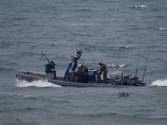
Israeli military bulldozers on Thursday morning moved dozens of meters into the blockaded Gaza Strip at the same time as Israeli navy attacked a Palestinian fishing boat off the enclave’s southern seashore.
Local sources said six Israeli bulldozers stationed at a military site along Gaza’s border crept into the eastern corners of Deir Balah city, in central Gaza Strip.
In the meantime, Israeli gunboats attacked overnight Palestinian fishermen sailing off Khan Younis coast within a four-nautical-mile zone.
The captain launched distress signals as soon as Israel’s navy unleashed gigantic water pumps in an attempt to make the vessel sink at sea.
Israeli military incursions near the border fence separating Gaza from territories occupied in 1948 have long been a near-daily occurrence.
The Israeli army also regularly detains and opens fire on unarmed Palestinian fishermen, shepherds, and farmers along the border areas.
The practices, often carried out under the security pretext, have destroyed much of the agricultural harvest and fishing equipment of the blockaded coastal enclave.
Blockaded by Israel -- by air, land and sea -- since 2007, the Gaza Strip has been grappling with a tough blockade, leaving thousands of sick civilians and humanitarian cases stranded in the world’s largest “open air prison.”
Local sources said six Israeli bulldozers stationed at a military site along Gaza’s border crept into the eastern corners of Deir Balah city, in central Gaza Strip.
In the meantime, Israeli gunboats attacked overnight Palestinian fishermen sailing off Khan Younis coast within a four-nautical-mile zone.
The captain launched distress signals as soon as Israel’s navy unleashed gigantic water pumps in an attempt to make the vessel sink at sea.
Israeli military incursions near the border fence separating Gaza from territories occupied in 1948 have long been a near-daily occurrence.
The Israeli army also regularly detains and opens fire on unarmed Palestinian fishermen, shepherds, and farmers along the border areas.
The practices, often carried out under the security pretext, have destroyed much of the agricultural harvest and fishing equipment of the blockaded coastal enclave.
Blockaded by Israel -- by air, land and sea -- since 2007, the Gaza Strip has been grappling with a tough blockade, leaving thousands of sick civilians and humanitarian cases stranded in the world’s largest “open air prison.”

The Gaza-based Palestinian Health Ministry has warned that hospitals in the besieged enclave have run out of first-aid medicines, leaving thousands of patients without treatment.
The Ministry’s spokesman Ashraf al-Qidra said in a press statement on Thursday that patients and children at Gaza hospitals are at risk of losing their lives after 70% of first-aid drugs along with medicines for chronic diseases and therapeutic milk have become at zero stock.
A few days earlier, the ministry has expressed deep concerns over serious setbacks to rock the health of thousands of chronically ill patients as a result of a sharp dearth in life-saving drugs.
Blockaded by Israel -- by air, land and sea -- since 2007, the Gaza Strip has been grappling with a tough blockade, leaving thousands of sick civilians and humanitarian cases stranded in the world’s largest “open air prison.”
The Ministry’s spokesman Ashraf al-Qidra said in a press statement on Thursday that patients and children at Gaza hospitals are at risk of losing their lives after 70% of first-aid drugs along with medicines for chronic diseases and therapeutic milk have become at zero stock.
A few days earlier, the ministry has expressed deep concerns over serious setbacks to rock the health of thousands of chronically ill patients as a result of a sharp dearth in life-saving drugs.
Blockaded by Israel -- by air, land and sea -- since 2007, the Gaza Strip has been grappling with a tough blockade, leaving thousands of sick civilians and humanitarian cases stranded in the world’s largest “open air prison.”
3 oct 2018

Israeli authorities have denied entry, into the West Bank, to more than half of the participants in an exhibition for Jordanian industries, a Jordanian official said on Wednesday.
Deputy Chairman of Amman Chamber of Commerce Adnan Ghaith said that 120 Jordanians who have registered to participate in the trade fair that opened on Tuesday, at the Convention Palace in Bethlehem, were denied entry, by Israel, to the occupied West Bank
Highlighting the glaring absence of attendees, Ghaith added that only 80 out of 200 Jordanian participants were allowed entry to participate in the 4th Jordanian Industries and Products Exhibition.
He slammed Israeli restrictions on guests’ entry to the occupied Palestinian territories as part of Israeli policies aimed at the disruption of such exhibitions aimed to promote Palestinian-Jordanian trade cooperation and exchange.
“Despite Israeli authorities’ efforts to impede the trade fair, our message is clear: We are determined to organize the exhibition in Palestine no matter what difficulties it faces,” said Ghaith, who is also chairman of the Jordanian committee that organizes industrial trade fairs.
This year’s edition of the three-day fair is designed to increase the annual share of Jordanian industries in the Palestinian market to $500 million, according to WAFA.
Deputy Chairman of Amman Chamber of Commerce Adnan Ghaith said that 120 Jordanians who have registered to participate in the trade fair that opened on Tuesday, at the Convention Palace in Bethlehem, were denied entry, by Israel, to the occupied West Bank
Highlighting the glaring absence of attendees, Ghaith added that only 80 out of 200 Jordanian participants were allowed entry to participate in the 4th Jordanian Industries and Products Exhibition.
He slammed Israeli restrictions on guests’ entry to the occupied Palestinian territories as part of Israeli policies aimed at the disruption of such exhibitions aimed to promote Palestinian-Jordanian trade cooperation and exchange.
“Despite Israeli authorities’ efforts to impede the trade fair, our message is clear: We are determined to organize the exhibition in Palestine no matter what difficulties it faces,” said Ghaith, who is also chairman of the Jordanian committee that organizes industrial trade fairs.
This year’s edition of the three-day fair is designed to increase the annual share of Jordanian industries in the Palestinian market to $500 million, according to WAFA.
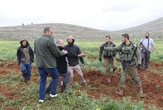
Israeli settlers uprooted dozens of Palestinian-owned olive trees on Wednesday, in the village of Turmusayya, north of the central occupied West Bank district of Ramallah.
Locals said that Israeli settlers from the illegal settlements of Adi Ad and Amichai, which were built on lands belongings to the residents of Turmusayya village, uprooted 40 olive trees.
Ma’an News Agency sources confirmed that the uprooted olive trees belonged to local Mahmoud al-Araj.
Israeli settlers constantly harass Palestinian farmers and residents in the village, in the attempt to force them out of their lands, as part of an Israeli plan to expand illegal settlements nearby.
For hundreds of Palestinian families, olive trees are the main source of income, however when harvest season approaches, Israeli settlers target Palestinian lands and cause severe economic damages.
According to a report by Israeli NGO B’Tselem, Israeli settlers’ vandalism in the occupied West Bank is a daily routine and is fully backed by Israeli authorities.
B’Tselem reported that “In just over two months, from the beginning of May to 7 July 2018, B’Tselem documented 10 instances in which settlers destroyed a total of more than 2,000 trees and grapevines and burned down a barley field and bales of hay.”
B’Tselem also argues that, under the guise of a “temporary military occupation,” Israel has been “using the land as its own: robbing land, exploiting the area’s natural resources for its own benefit and establishing permanent settlements,” estimating that Israel had dispossessed Palestinians from some 200,000 hectares (494,211 acres) of lands in the occupied Palestinian territory over the years.
Between 500,000 and 600,000 Israelis live in Jewish-only settlements across occupied East Jerusalem and the West Bank, in violation of international law, with recent announcements of settlement expansion provoking condemnation from the international community.
Locals said that Israeli settlers from the illegal settlements of Adi Ad and Amichai, which were built on lands belongings to the residents of Turmusayya village, uprooted 40 olive trees.
Ma’an News Agency sources confirmed that the uprooted olive trees belonged to local Mahmoud al-Araj.
Israeli settlers constantly harass Palestinian farmers and residents in the village, in the attempt to force them out of their lands, as part of an Israeli plan to expand illegal settlements nearby.
For hundreds of Palestinian families, olive trees are the main source of income, however when harvest season approaches, Israeli settlers target Palestinian lands and cause severe economic damages.
According to a report by Israeli NGO B’Tselem, Israeli settlers’ vandalism in the occupied West Bank is a daily routine and is fully backed by Israeli authorities.
B’Tselem reported that “In just over two months, from the beginning of May to 7 July 2018, B’Tselem documented 10 instances in which settlers destroyed a total of more than 2,000 trees and grapevines and burned down a barley field and bales of hay.”
B’Tselem also argues that, under the guise of a “temporary military occupation,” Israel has been “using the land as its own: robbing land, exploiting the area’s natural resources for its own benefit and establishing permanent settlements,” estimating that Israel had dispossessed Palestinians from some 200,000 hectares (494,211 acres) of lands in the occupied Palestinian territory over the years.
Between 500,000 and 600,000 Israelis live in Jewish-only settlements across occupied East Jerusalem and the West Bank, in violation of international law, with recent announcements of settlement expansion provoking condemnation from the international community.
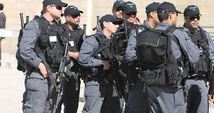
The Israeli municipal and tax authorities on Tuesday launched a campaign against Palestinian storeowners and car drivers in Shu'fat refugee camp, northeast of Occupied Jerusalem.
According to local sources, municipal and taxation employees escorted by police officers stormed Shu’fat camp and embarked on searching Palestinian stores and slapping financial penalties on the owners for alleged violations.
Car drivers were also fined during the same campaign in the camp.
The Israeli occupation authority forces the Palestinians in Jerusalem to pay heavy taxes, such as the national insurance tax, for services they barely receive These taxes often exceed their incomes and revenues.
The Israeli tax system used against the Palestinians in Jerusalem violates the international law, which considers east Jerusalem as occupied territory and thus, Israeli law should not be applied to the area.
According to local sources, municipal and taxation employees escorted by police officers stormed Shu’fat camp and embarked on searching Palestinian stores and slapping financial penalties on the owners for alleged violations.
Car drivers were also fined during the same campaign in the camp.
The Israeli occupation authority forces the Palestinians in Jerusalem to pay heavy taxes, such as the national insurance tax, for services they barely receive These taxes often exceed their incomes and revenues.
The Israeli tax system used against the Palestinians in Jerusalem violates the international law, which considers east Jerusalem as occupied territory and thus, Israeli law should not be applied to the area.
2 oct 2018
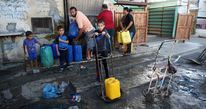
The Palestinian Central Bureau of Statistics (PCBS) announced on Tuesday that the percentage of families with a safe source of potable water in the Gaza Strip is 11% compared to 95% in the West Bank.
According to data released by PCBS, 62% of Palestinian families live in houses that receive drinking water from safe sources, including public water networks connected to the house, public taps, protected water-well, rain water collection pools, and mineral water. This figure is 58% in urban areas, 94% in rural areas, and 44% in refugee camps.
PCBS pointed out that 7% of the residents of the Gaza Strip rent houses, while the percentage is 10% in the Occupied West Bank. The percentage of citizens living in rented houses is 8% (10% in urban areas, 3% in rural areas and 7% in refugee camps).
Housing indicators include: Adequate housing according to Residence III Document for the implementation of the new urban plan, which provides a number of appropriate characteristics and conditions in the housing units, such as housing tenure, housing type, housing density, and access to public networks and infrastructure services.
The population of Palestine hit 4.781 million in 2017, with the urban population making 77%, and the rural population making 15%, and the refugee population making 8%. The population density hit 794 people per one square km in Palestine.
Compared to previous censuses from 1997-2017, the data indicated that the percentage of households in which one of its owners live increased significantly, from 78% in the 1997 census to 81% in the 2007 census, and 86% in the 2017 census.
As for the type of community, in 2017, 84% lived in urban areas, and 93% lived in rural areas, while 89% lived in camps. As for houses owned in the West Bank, it hit 87% of the population, compared to 83% in the Gaza Strip. According to the 2017 census, the percentage of families in Palestine living in an apartment constitutes 62% of the total number of families (66% in urban areas, 38% in rural areas and 68% in refugee camps). On the level of the region, data showed that 54% of people in the West Bank live in an apartment compared to 77% in the Gaza Strip.
The statistics revealed that 36% of families in Palestine live in a house (32% in urban areas, 58% in rural areas and 31% in refugee camps). The percentage of families in Palestine who live in villas is 1.1% (1.4% in the West Bank and 0.5% in the Gaza Strip).
The data also indicate that 7% of families in Palestine live in residential units with a high density of 3 persons or more per room, with 5% in the West Bank and 12% in the Gaza Strip. On the level of the type of the community, it is 7% in urban and rural areas, and 13% in the refugee camps. The average housing density is 1.3 persons per room in the West Bank and 1.6 persons per room in the Gaza Strip.
According to data released by PCBS, 62% of Palestinian families live in houses that receive drinking water from safe sources, including public water networks connected to the house, public taps, protected water-well, rain water collection pools, and mineral water. This figure is 58% in urban areas, 94% in rural areas, and 44% in refugee camps.
PCBS pointed out that 7% of the residents of the Gaza Strip rent houses, while the percentage is 10% in the Occupied West Bank. The percentage of citizens living in rented houses is 8% (10% in urban areas, 3% in rural areas and 7% in refugee camps).
Housing indicators include: Adequate housing according to Residence III Document for the implementation of the new urban plan, which provides a number of appropriate characteristics and conditions in the housing units, such as housing tenure, housing type, housing density, and access to public networks and infrastructure services.
The population of Palestine hit 4.781 million in 2017, with the urban population making 77%, and the rural population making 15%, and the refugee population making 8%. The population density hit 794 people per one square km in Palestine.
Compared to previous censuses from 1997-2017, the data indicated that the percentage of households in which one of its owners live increased significantly, from 78% in the 1997 census to 81% in the 2007 census, and 86% in the 2017 census.
As for the type of community, in 2017, 84% lived in urban areas, and 93% lived in rural areas, while 89% lived in camps. As for houses owned in the West Bank, it hit 87% of the population, compared to 83% in the Gaza Strip. According to the 2017 census, the percentage of families in Palestine living in an apartment constitutes 62% of the total number of families (66% in urban areas, 38% in rural areas and 68% in refugee camps). On the level of the region, data showed that 54% of people in the West Bank live in an apartment compared to 77% in the Gaza Strip.
The statistics revealed that 36% of families in Palestine live in a house (32% in urban areas, 58% in rural areas and 31% in refugee camps). The percentage of families in Palestine who live in villas is 1.1% (1.4% in the West Bank and 0.5% in the Gaza Strip).
The data also indicate that 7% of families in Palestine live in residential units with a high density of 3 persons or more per room, with 5% in the West Bank and 12% in the Gaza Strip. On the level of the type of the community, it is 7% in urban and rural areas, and 13% in the refugee camps. The average housing density is 1.3 persons per room in the West Bank and 1.6 persons per room in the Gaza Strip.
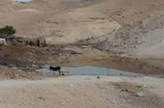
Illegal Israeli colonialist settlers flooded the al-Khan al-Ahmar Bedouin Palestinian community with Sewage water, in an attempt to force the inhabitants to leave their Dwellings, just as the ultimatum set by the Israeli court for their displacement went into effect, Monday.
Abdullah Abu Rahma, a senior nonviolent activist and the head of Save al-Khan al-Ahmar Campaign, said both the Israeli soldiers and the colonialist settlers are constantly increasing the suffering of the Palestinians, and continuously violating their rights, even their very existence, in order to remove and displace them.
Abu Rahma said the assailants, from Kfar Adumim illegal colony, flooded the community with Sewage water, in yet another means of assaults and violations against nearly 200 Palestinians, including children.
“Both the settlers and the soldiers are partaking in these violations and war on the inhabitants of a-Khan al-Ahmar,” he said, “But the violations, and isolation of the community, will not only increase the steadfastness and determination of the villagers.”
He also called for increasing the support and solidarity with the Bedouin community, to foil the illegal Israeli plans of displacement, and replacing the Palestinians with illegal colonialist settlers.
|Hanna: “Israel Is Practicing Ethnic Cleansing In Al-Khan Al-Ahmar”|
Eid Abu Dahouk, the mayor of al-Khan al-Ahmar, said that “by flooding the community with sewage, the colonialist settlers are engaging in a new form of war against the inhabitants.
He warned of the grave consequences, and health risks resulting from this serious violation against al-Khan al-Ahmar, especially the children, in addition to the livestock, the only source of livelihood of the families.
The Palestinians, along with international peace activists, are ongoing with their nonviolent protests in al-Khan al-Ahmar, despite the constant assaults, violations and threats of forceful eviction.
|P.A. To Head To ICC Over Al-Khan Al-Ahmar Demolition|
On September 5th, the Israeli supreme court denied an appeal against the demolition of the Palestinian community, and ordered its removal and displacement.
The first ruling by the court was made in May of this year, when it granted the military a green light for demolishing it.
There are approximately 200 Palestinians living in al-Khan al-Ahmar, %53 of them are children, and %95 of the population are refugees officially registered by the UNRWA. The community has one school providing education to 170 children.
It is worth mentioning that al-Khan al-Ahmar is surrounded by several illegal Israeli colonies, while Israel wants to remove it as part of its E1 colonialist project, which aims at surrounding occupied Jerusalem with a chain of Jewish-only colonies, and blocking the geographical contiguity of the occupied West Bank, and completely isolating the Palestinians from Jerusalem
Abdullah Abu Rahma, a senior nonviolent activist and the head of Save al-Khan al-Ahmar Campaign, said both the Israeli soldiers and the colonialist settlers are constantly increasing the suffering of the Palestinians, and continuously violating their rights, even their very existence, in order to remove and displace them.
Abu Rahma said the assailants, from Kfar Adumim illegal colony, flooded the community with Sewage water, in yet another means of assaults and violations against nearly 200 Palestinians, including children.
“Both the settlers and the soldiers are partaking in these violations and war on the inhabitants of a-Khan al-Ahmar,” he said, “But the violations, and isolation of the community, will not only increase the steadfastness and determination of the villagers.”
He also called for increasing the support and solidarity with the Bedouin community, to foil the illegal Israeli plans of displacement, and replacing the Palestinians with illegal colonialist settlers.
|Hanna: “Israel Is Practicing Ethnic Cleansing In Al-Khan Al-Ahmar”|
Eid Abu Dahouk, the mayor of al-Khan al-Ahmar, said that “by flooding the community with sewage, the colonialist settlers are engaging in a new form of war against the inhabitants.
He warned of the grave consequences, and health risks resulting from this serious violation against al-Khan al-Ahmar, especially the children, in addition to the livestock, the only source of livelihood of the families.
The Palestinians, along with international peace activists, are ongoing with their nonviolent protests in al-Khan al-Ahmar, despite the constant assaults, violations and threats of forceful eviction.
|P.A. To Head To ICC Over Al-Khan Al-Ahmar Demolition|
On September 5th, the Israeli supreme court denied an appeal against the demolition of the Palestinian community, and ordered its removal and displacement.
The first ruling by the court was made in May of this year, when it granted the military a green light for demolishing it.
There are approximately 200 Palestinians living in al-Khan al-Ahmar, %53 of them are children, and %95 of the population are refugees officially registered by the UNRWA. The community has one school providing education to 170 children.
It is worth mentioning that al-Khan al-Ahmar is surrounded by several illegal Israeli colonies, while Israel wants to remove it as part of its E1 colonialist project, which aims at surrounding occupied Jerusalem with a chain of Jewish-only colonies, and blocking the geographical contiguity of the occupied West Bank, and completely isolating the Palestinians from Jerusalem
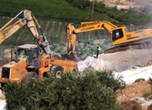
Many illegal Israeli colonists invaded, on Tuesday at dawn, Palestinian agricultural lands in Khirbat Lafjan area, east of Aqraba village, south of Nablus in the northern part of the occupied West Bank, and uprooted dozens of trees.
Ghassan Daghlas, a Palestinian official who monitors Israel’s colonialist activities in northern West Bank, said the assailants came from Itamar illegal colony, which was built on Palestinian lands.
He added that the colonists bulldozed and uprooted more than 200 Dunams, owned by members of Sbeih and al-At’out families.
Daghlas also stated that Israeli soldiers were present near the area, but did not attempt to stop the attacks.
It is worth mentioning that the army has recently informed the Palestinians that their lands “are owned by the state,” and will soon be used for military training.
Ghassan Daghlas, a Palestinian official who monitors Israel’s colonialist activities in northern West Bank, said the assailants came from Itamar illegal colony, which was built on Palestinian lands.
He added that the colonists bulldozed and uprooted more than 200 Dunams, owned by members of Sbeih and al-At’out families.
Daghlas also stated that Israeli soldiers were present near the area, but did not attempt to stop the attacks.
It is worth mentioning that the army has recently informed the Palestinians that their lands “are owned by the state,” and will soon be used for military training.
1 oct 2018

Israeli fanatics went on a rampage late Sunday in Occupied Jerusalem as they marked the end of the Jewish Succot holiday.
Local sources said extremist Israeli settlers scoured Palestinian neighborhoods near Musrara area.
The extremists assaulted Palestinians, smashed parked Palestinian cars and damaged shops as they marched across Jerusalem’s streets.
Israeli police forces, which were present in large numbers, did not stop the extremist vigilantes but instead fired stun grenades at the Palestinians who tried to defend themselves, their homes and their property.
Red Crescent paramedics said a Palestinian young man was treated for bruises he sustained in the assault.
Over recent days, Israeli police have closed off several roads across occupied Jerusalem to smooth the movement of the extremist Israelis during their holiday and barred Palestinians from reaching their homes.
Local sources said extremist Israeli settlers scoured Palestinian neighborhoods near Musrara area.
The extremists assaulted Palestinians, smashed parked Palestinian cars and damaged shops as they marched across Jerusalem’s streets.
Israeli police forces, which were present in large numbers, did not stop the extremist vigilantes but instead fired stun grenades at the Palestinians who tried to defend themselves, their homes and their property.
Red Crescent paramedics said a Palestinian young man was treated for bruises he sustained in the assault.
Over recent days, Israeli police have closed off several roads across occupied Jerusalem to smooth the movement of the extremist Israelis during their holiday and barred Palestinians from reaching their homes.
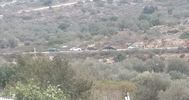
Israeli occupation forces and groups of Israeli settlers on Monday afternoon attacked Palestinian citizens while they were picking olives in Azzun town, east of Qalqilya.
Local sources told the PIC reporter that the settlers assaulted the Palestinian citizens near the Apartheid Wall while escorted by Israeli soldiers.
The Israeli forces further disrupted the Palestinian farmers' work and detained six of them, they added.
Local sources told the PIC reporter that the settlers assaulted the Palestinian citizens near the Apartheid Wall while escorted by Israeli soldiers.
The Israeli forces further disrupted the Palestinian farmers' work and detained six of them, they added.
Page: 33 - 32 - 31 - 30 - 29 - 28 - 27 - 26 - 25 - 24 - 23 - 22 - 21 - 20 - 19 - 18 - 17 - 16 - 15 - 14 - 13 - 12
